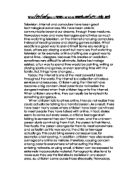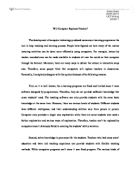Disadvantages of Television, Internet and Computers
Television, internet and computers have been great technological advances. We have been able to communicate beyond our dreams, through these mediums. Nowadays more and more teenagers spend twice as much time watching television, on the internet and using computers, instead of reading books and playing games outside. What exactly is a good way to spend time? Some say reading a book, others say playing a sport but many say that watching television or for example, online chatting are a great way to spend time. I disagree, because this creates an addiction, sometimes very difficult to eliminate. Before technology existed, a fun way to spend time would be painting, writing or playing sports and games, or even spending time with the family. But, things have changed…

This is a preview of the whole essay
Peer Reviews
Here's what a star student thought of this essay
Quality of writing
The Quality of Written Communication (QWC) is fair, though not perfect. The candidate makes the mistake of comma splice as early as the first paragraph. Comma splice is when a comma is used without reason e.g. "But, things have changed… (sic)." The commas after "But" is needless, and disrupts the grammatical standard that is required of GCSE English students. Also, this candidate stick to very basic vocabulary (a reason for the very watered-down argument) and punctuation, Experimenting with more complex vocabulary can only improve your answer, as it suggests you have a greater knowledge and inventory with which to express your argument, and the readers will like to see an expert in the arguer's seat. The improvement of your punctuation will just refine the structure and confidence of your answer, so get learning how to use those colons and semi-colons accurately, to gain higher QWC marks.
Level of analysis
The quality of the argument is fair, though the consistency of it, and the specification of what is said is poor. A lot fo the comment made are general and do not carry much weight - use of the words like "fun" when trying to describe alternatives to computers do not carry that same weight as words like "just as valuable, if not more so [not sourced from candidate's answer]". An argument needs stronger language than the basic vocabulary that is used here. A further issue with this candidate's answer is the sweeping generalisations and poorly-evidence opinion-as-fact. It is fine enough to simply say that "Most parents do not realize the dangers involved when their children log onto the Internet (sic)" but this statement - arguably a very bold one - has no factual evidence provided and thus does not help the argument at all. In fact, it could pass as erroneous because I'm certain parents are made very well aware of the dangers their children face and they act accordingly to ensure that their child is safe. Where this answer is a success however, are the use of other argumentative devices that strengthen the rest of the argument - devices like repetition "television, internet and computers" are consistently group together so the readers make a link that they all carry bad connotations; the use of rhetoric and Second Person Address: "This is my opinion... How about yourself? (sic)"; though I would have liked to have seen at least one attempt at voice of the specialist. Even if it is made-up, the expert opinion is a great way to add weight to an argument - statistics also help but it is advised that candidate be wary of not being too optimistic with statistics e.g. "99.9% of parents to do not understand the dangers of the Internet [not sourced from the candidate's answer]", for example, as this pushes the boundaries of rationality and, even if such a statistic existed for this kind of information, it simply could not be that high.
Response to question
This is a Writing to Argue task, and in it, the candidate takes a very relevant topic that is often of great concern to a large number of people and makes a fair argument against the "addiction" to computers. I would have to say I would like to have seen more evidence of the techniques required to shape a powerful argument because quite frequently the candidate finds themselves slipping in terms of focus and/or their ability to present a cohesive argument. The focus that is shown is fairly good, but a stronger focus would improve this answer greatly, as if would cut down the waffle and general comments that could be tied to any argument about computers and television - it is important that candidate pays undivided attention to the question at all times and makes sure they are consistently voicing their opinion without contradicting themselves.









